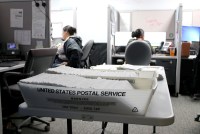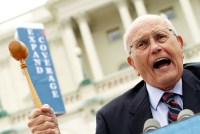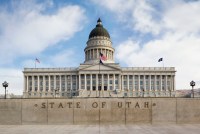Latest KFF Health News Stories
Return To Sender: A Single Undeliverable Letter Can Mean Losing Medicaid
Colorado, like a number of states, is struggling to deal with returned mail sent out by its Medicaid, SNAP and other aid programs. Now people could lose benefits after just a single piece of returned mail.
States Try A Gentler Approach To Getting Medicaid Enrollees To Work
Facing GOP pressure to install work requirements for adults getting Medicaid coverage, some states seek instead to offer more opportunities for job training.
The Deep Divide: State Borders Create Medicaid Haves And Have-Nots
State borders can highlight Medicaid’s arbitrary coverage. On the Missouri side of the Mississippi River, low-income people struggle with untreated health issues. But on the Illinois side, people in similar straits can get health care because their state expanded its Medicaid program under the Affordable Care Act.
Uber And Lyft Ride-Sharing Services Hitch Onto Medicaid
Ride-sharing companies promise better service for enrollees and lower costs for states. But the services are not for everyone on Medicaid.
How Political Maneuvering Derailed A Red State’s Path To Medicaid Expansion
When Kansas elected Laura Kelly as governor, Medicaid expansion looked like a shoo-in, with seemingly broad support across state government. It didn’t happen. A look at conservatives’ new health care playbook and the politics of obstruction. Health care for 130,000 Kansans hangs in the balance.
Coordinating Care Of Mind And Body Might Help Medicaid Save Money And Lives
Tennessee’s innovative Medicaid program is offering bonuses to mental health providers who help make sure their Medicaid patients get preventive help and treatment for physical ailments, too.
Newly Blue Maine Expands Access To Abortion
After a wave of Democratic women were elected in 2018, Maine joins the handful of states that are shoring up the right to an abortion ahead of expected Supreme Court challenges.
New Budget Boosts Health Coverage For Low-Income Californians
California lawmakers spent big on Medi-Cal in the 2019-20 state budget, voting to cover more older residents and people with disabilities, restore benefits cut during the recession and open the program to eligible young adults who are in the country illegally.
Study: Arkansas Medicaid Work Requirement Hits Those Already Employed
More than 95% of the Arkansas residents targeted by the state’s Medicaid work requirement were already working or met the criteria to be exempted from the mandate, according to a study in the New England Journal of Medicine.
CMS Ignores Federal Judge Ruling To Approve Medicaid Work Rules in Utah
Work helps make people healthier, CMS chief Seema Verma said in approving Utah’s waiver request to tie government health benefits to employment or volunteer work. But Judge James Boasberg has said that isn’t the goal of Medicaid.
Federal Judge Again Blocks Medicaid Work Requirements
The decision applies only to Kentucky and Arkansas, and many experts expect the administration and other conservative states to continue to move forward on rules that would limit coverage for people who don’t work.
Medicaid Expansion Boosts Hospital Bottom Lines — And Prices
Colorado officials say hospitals are better off financially after the state expanded coverage to more low-income residents, but that hasn’t stopped them from shifting more costs to other insured patients.
Progressives Tout ‘Medicare-For-All’ But States Eye ‘Medicaid Buy-In’
New Mexico is one of several states looking at offering consumers a government-sponsored plan. The proposals would typically have benefits similar to what is available in Medicaid, the state-federal health plan for low-income people.
Utah’s Novel Plan For Medicaid Expansion Opens Door To Spending Caps Sought By GOP
Utah’s proposal to limit federal and state funding on Medicaid is a radical change. Anti-poverty advocates are concerned that caps could limit how many people are enrolled and restrict services. They also worry other states would adopt a similar plan.
Direct And Unfiltered: John Dingell’s Popular Health Care Tweets
Although his posts dealt with a wide variety of issues, Dingell’s longtime devotion to improving health care was a frequent topic.
Utah Voters Approved Medicaid Expansion, But State Lawmakers Are Balking
Political fights over health care continue to flare. In Utah, angry voters say lawmakers are disregarding their wishes by trying to limit the scope of a ballot referendum that expanded Medicaid.
Shrinking Medicaid Rolls In Missouri And Tennessee Raise Flag On Vetting Process
State health officials say several factors, including the improved economy, are behind the 7 percent drop last year in Missouri and 9 percent reduction in Tennessee of Medicaid recipients. But advocates for the poor are worried the states’ efforts to weed out residents who are improperly enrolled has led to people mistakenly forced off the rolls.
Utah and Idaho Lawmakers Seek To Scale Back Voter-Approved Medicaid Expansions
The legislators say that despite voter support for expansion, they are concerned that a change in the Medicaid program will be a financial burden for the states.
With Mom’s Green Card On The Line, Family Forgoes Autism Services For Citizen Child
A Texas girl needs autism treatment, but her immigrant mother is afraid of turning to Medicaid. As more U.S. children go without health coverage, advocates blame politics of intimidation.
Providers Walk ‘Fine Line’ Between Informing And Scaring Immigrant Patients
Some doctors and clinics are proactively informing patients about a proposed policy that could jeopardize the legal status of immigrants who use public benefit programs such as Medicaid. Others argue that because this “public charge” proposal isn’t final — and may never be adopted — disseminating too much information could create unnecessary alarm and cause some patients to drop benefits.


























